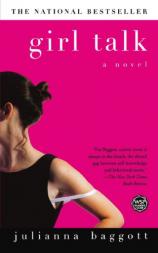Reading Group Guide
Discussion Questions
Girl Talk: A Novel

1. Girl Talk features a rich cast of lively "minor" characters -- Juniper Fiske, Ruby Pantuliano, Kitty Hawk, Peter Kinney, Jacko the dog. How does each character contribute to the overall flavor of the novel? Compare Julianna Baggott's narrative and characterization techniques to the techniques of such writers as John Irving, Jane Smiley, and Anne Tyler.
2. What is the particular role of humor in this novel? Discuss the ways the author fuses comedy and pathos in many of Girl Talk's scenes. How would you describe the tone that results from this delicate combination?
3. Discuss Baggott's novel alongside recent films, plays, and other novels which similarly illuminate: the dynamics and intermittent fracturings of family relationships; the transition from girlhood to womanhood; the alternately comforting and haunting specter of the past on our present lives.
4. The persistence of memory -- the ways in which remembering one's past continues to color and influence one's present -- is certainly among the chief concerns in Baggott's story. What does the author achieve by switching back and forth between the present and the past?
5. One of the dominant motifs in Girl Talk considers the subtle distinctions between honesty and truth. Lissy tells us that her mother instructed her to "choose the truth." But later, Lissy realizes "that nobody seemed to know the truth." And elsewhere, the act of lying is held up as a sort of art form, one to be honed and developed. What is Baggott up to here? Is truth inherently subjective? Dottie's ultimate lesson for Lissy is to, again, "choose [her own] truth and move on." Which of Baggott's characters seem to have the firmest grasp on truth and reality?
6. How do sexuality and sex figure in the lives of Dottie, Lissy, Juniper, Ruby, and Kitty Hawk? What compels Dottie to share such intimate and often graphic details about her sex life to her young daughter? Discuss Baggott's portrait of Dottie as a whole. How does Dottie's relationship with her own mother, Evelyn, for example, come to color Dottie's subsequent relationship with Lissy? And how does Dottie's alternating candor and ambiguity with regard to talking about sex seem to affect Lissy's attitude toward and relationship with her own sexuality, both as a girl and as a woman?
7. "The summer that never happened" was, in fact, possibly the most influential summer of Lissy's life. So why the "never happened" label? Discuss the disparate elements of irony, repression, and melancholy which inform Dottie and Lissy's largely unspoken feelings about that pivotal summer.
8. Julianna Baggott is a celebrated poet, and to read Girl Talk is to understand exactly why. Discuss Baggott's vivid use of recurring imagery (especially that of water), her lyrical evocations of Lissy's memories, and her skillful use of rhythm and well-placed silences to convey different emotions.
9. Talk about the mothers and the fathers in this novel; the ones who disappear, physically or emotionally, the ones who stay and the ones who never come into the picture in the first place. Is there a pattern here? Who is the ideal parent? Is Juniper the sort of person who should not have become a parent? Why? What sort of mother is Dottie? What sort of father is Bob?
10. Lissy imagines Bob's homecoming after the summer that never happened. Likewise, she pictures her own consummation in a tent at Woodstock. Discuss these scenes alongside others in which Lissy endeavors to imagine events that she can never know firsthand. In Lissy's renderings, what clues can we glean about Lissy's feelings for her mother -- whether of resentment, understanding, or affection?
11. Is Girl Talk a love story? If so, whose love story? Lissy claims that it's certainly not hers. Why not?
12. In the particular emotional realm of this novel, what does it cost to love -- and what does it finally mean to love? Considering what happens to her characters and their relationships in Girl Talk, what does Julianna Baggott seem to be suggesting about love and the ways it has evolved over the course of the novel's two generations?
13. Lissy chooses in the end not to follow Church across the country. Dottie chooses not to follow Anthony into the crowds of Woodstock. What parallels and distinctions exist between these pivotal decisions?
14. Imagine an alternate version of Girl Talk in which Bob does not come home at the end of the summer that never happened. Or one in which Dottie actually knocks on Anthony's door -- and he welcomes her in? What if Lissy told Peter she was pregnant with his child? Would any of these choices ring true, considering the characters we've come to know? Why or why not?
15. "You can choose to be happy. You can pick it up, like a dress from a hanger, and slip it on." Dottie's conviction here contrasts sharply with the way Church comes to see the world. "We have no control," he says at one point. "All I want is control over my own life." Here, Baggott underscores the principle tension plaguing her novel's heroine -- the struggle between notions of an immutable fate and an ever-malleable free will. Who in this novel would you say ultimately wins the most control over her or his own life? Explain.
16. Lissy tells us that she is "more like my mother than even my mother."
At what points in your own life -- including the present -- have you been able to identify wholeheartedly with this statement, for better or worse? Discuss the ways Lissy has come to feel caught between choosing not to follow Dottie's path in life and being unable to break the pattern. How much, in fact, does Lissy resemble Dottie? And in what ways is Dottie like her own mother, Evelyn?
17. "There's only a tiny sliver of this story that I can tell with any precision," states Lissy. Is Lissy a "reliable" narrator? Why? Discuss the richly comic irony in the fact that Lissy -- a narrator so tirelessly preoccupied with the relative truth and honesty and accuracy of her story -- is ambivalently pursuing a career as, of all things, an advertising copywriter.
18. Dino says growing old allows you to pile up more and more regrets. What do you suppose Dottie regrets? Evelyn? Explain.
19. Discuss the intermittent mythological and biblical references in Girl Talk. Lissy likens her father's affair to a "miraculous" event, and she compares her own mother to Mary and Bob to Joseph. Later, a therapist tells Lissy she suffers from two Electra Complexes as a result of her having two fathers; and the one-eyed Anthony comes to resemble Cyclops in Lissy's mind. How do these allusions contribute to Girl Talk's central themes?
20. "Sometimes the only way to fix a mistake is to make it twice." Dottie's assertion to Lissy is echoed later in the novel with an even more hopeful -- and vaguely spiritual -- tone when she says that "our mistakes lead us to grace." Does the truth of these statements bear out when we look at the major choices and mistakes made in this novel? What "grace" is discovered by Baggott's characters in the end?
Girl Talk: A Novel
- Publication Date: January 1, 2002
- Genres: Fiction
- Paperback: 272 pages
- Publisher: Washington Square Press
- ISBN-10: 0743400836
- ISBN-13: 9780743400831








